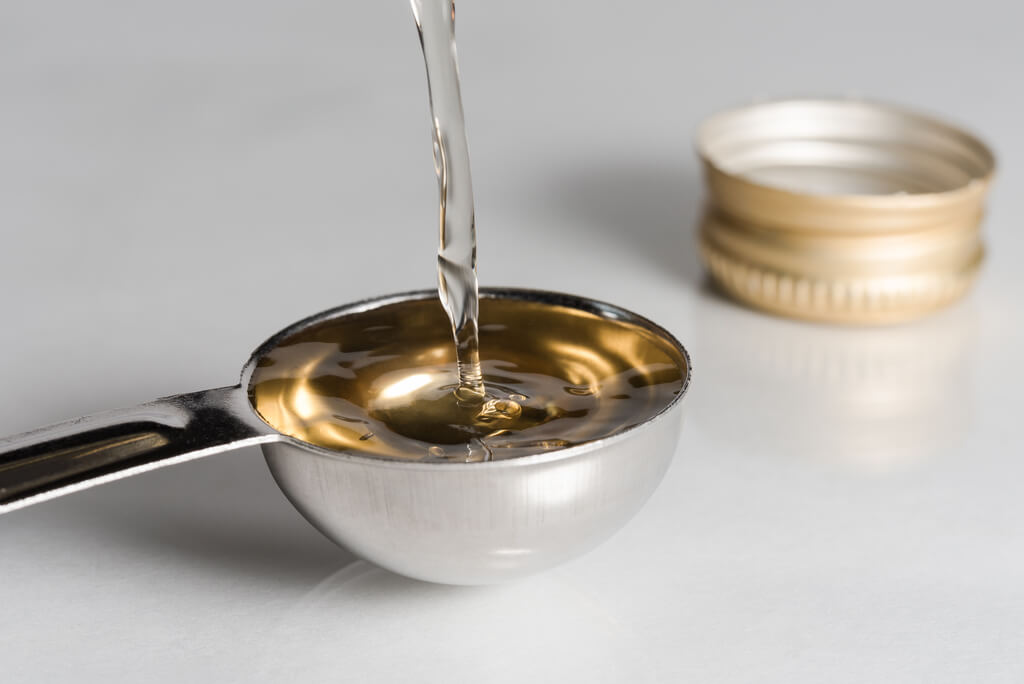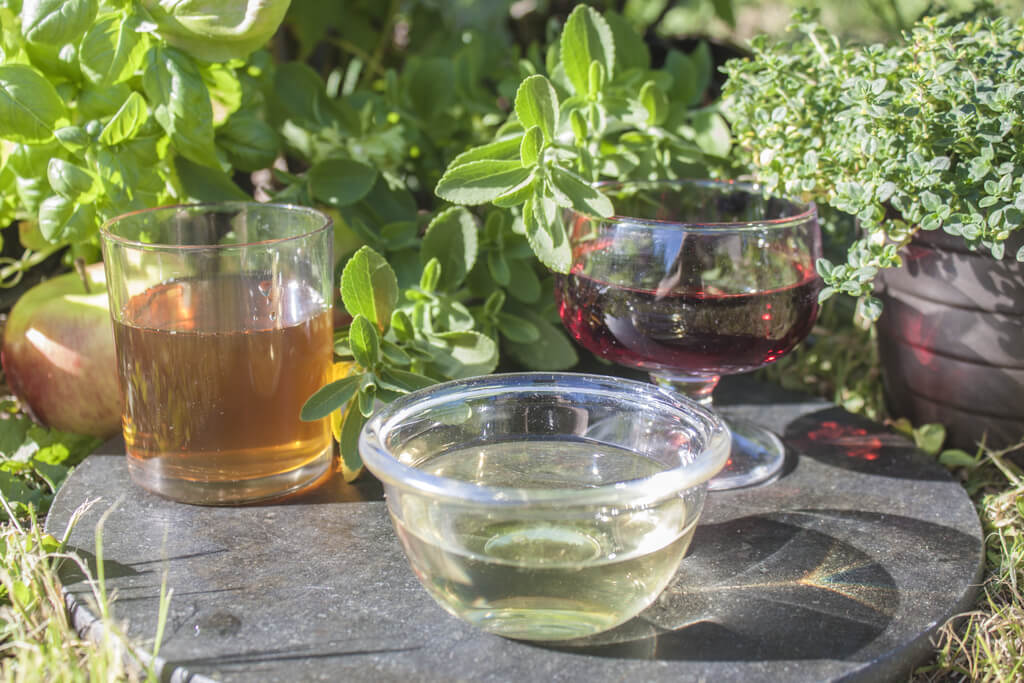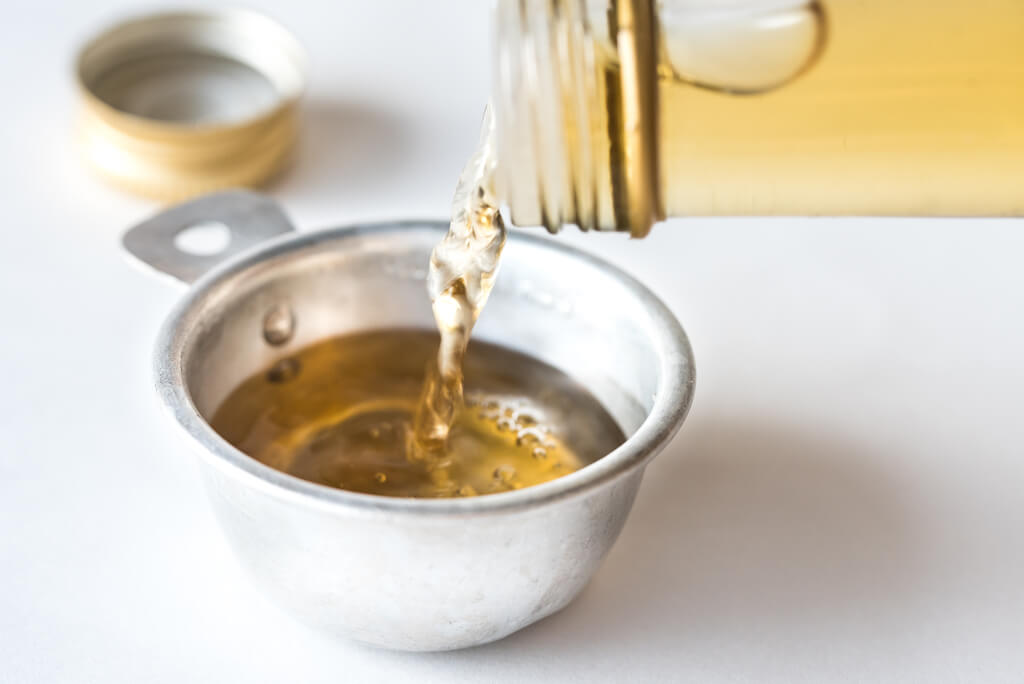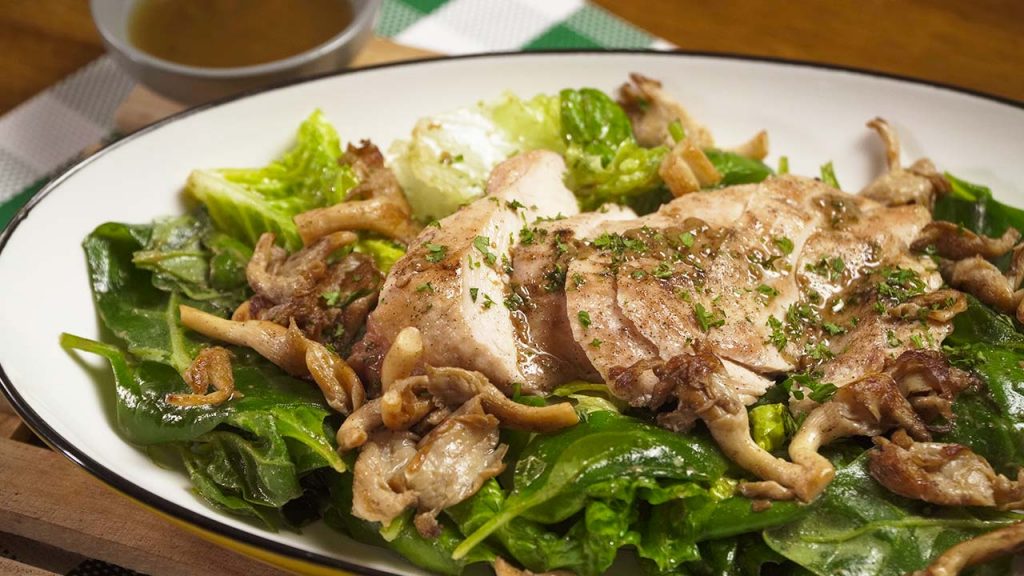
If you like cooking French recipes that typically require the subtle flavor of white wine vinegar, then you better know a white wine vinegar substitute you can use when you ran out of it. Made from fermented white wine, this ingredient lends tangy and floral notes to any dish that needs a boost. This condiment is also used for marinating, pickling, and making delicious sauces such as hollandaise and béarnaise sauces.
You might think replacing the light and delicate flavors of white wine vinegar is difficult, but it’s quite simple! In this article, we’ve narrowed down these substitutes for white wine vinegar that you might already have in your pantry.
What Can I Substitute for White Wine Vinegar?

In the middle of making a cucumber salad recipe but discovered you’re missing one important ingredient? Fret not! You can skip the sudden trip to the grocery store with these white wine vinegar substitute options:
Red Wine Vinegar
Despite its bold red color, red wine vinegar is one of the best substitutes for white wine vinegar because they’re both made from wine. But it’s also important to know what sets them apart from each other.
While white wine vinegar is delicate with a milder acidic flavor, red wine vinegar is rather bold with its stronger acidic flavor. For that reason, this alternative is more suitable for marinating meats, pickling foods, and flavor vinaigrettes and salads if you’re looking for a bolder flavor.
As white wine vinegar complements white meat better, this swap alternatively works best with dark or red meats. Additionally, it is not recommended for light-colored dishes because of its striking color. If you want to use it as a substitute, you can start with one tablespoon for every spoon of white wine vinegar for a 1:1 substitution.
READ ALSO: 8 Best Red Wine Vinegar Substitute Choices and How To Make It
Rice Vinegar
Rice vinegar, for those unaware, is made with fermented rice and is similar to white wine vinegar in terms of taste. Like white wine vinegar, it is light and slightly acidic. This makes rice vinegar an excellent white wine vinegar substitute as it closely resembles its taste.
Do note that mirin, although another fermented rice product, is not the same as rice vinegar. Mirin is much sweeter and lacks the acidity you need to substitute white wine vinegar appropriately.
Both rice and white wine vinegar work well for Asian dishes like stir-fry recipes, plus they imbue light salads with a dash of sweetness. However, it’s important to note that there are two variants of rice vinegar: unseasoned and seasoned rice vinegar. Considering its taste and color, the unseasoned variant is more suited as a substitute. Thus, it can be used in equal proportion with white wine vinegar.
READ ALSO: Rice Wine Vinegar and Rice Wine: How Are They Different?
Sherry Vinegar
Considered a gourmet condiment made from sherry, this medium-bodied and sweet alternative shares some of the flavor profile with the famous ingredient. Similar to other types of wine vinegar, it tastes rich, nutty, and somewhat sweet with caramel undertones. But its slightly more delicate flavor fits light salads, white meat marinades, and sauces more than dishes with stronger and bolder flavor profiles.
Comparable to white wine vinegar, this condiment is also not as overpowering as other kinds of vinegar on the market. However, it does have a very distinct flavor often used in Spanish dishes. And as it ages, sherry vinegar becomes darker and more robust in taste. In this case, lighter-colored sherry wines would be a suitable replacement for white wine vinegar. Using a 1:1 ratio for this alternative is recommended.
Apple Cider Vinegar
As a staple in most households, you might already have some apple cider vinegar in your pantry. But can you use apple cider vinegar instead of white wine vinegar in your cooking? Certainly, but with a few notes to consider:
This swap is made from fermented apples which gives it a sweet yet strong sour taste that is quite pungent. Some brands offer dark-colored apple cider vinegar but light-colored ones are also available. However, apple cider vinegar has a stronger and bolder taste compared to white wine vinegar. It is much more sour and fruity while white wine vinegar is more subtle in taste.
Considering its qualities, this substitute for white wine vinegar is more suitable for bold-flavored dishes that require a strong sour taste rather than delicate dishes. You can use it in marinades, pickles, soups, and stews with complex and strong flavors. Additionally, it is best for pickling solutions or salad dressings due to its strong apple notes.
Use a 1:1 ratio if you’re planning to use this replacement as such and if the dish would benefit from its sourness. However, you might want to start with half of what the recipe calls for, adding more as you desire in other applications.
Champagne Vinegar
Similar to how red wine vinegar is made, this substitute is created by fermenting champagne. Generally on the sweeter side in the world of wine and alcohol, champagne is mild and delicate in taste, offering a closer approximation to white wine vinegar. With that, it caters more to light-flavored dishes and ingredients such as chicken, seafood, and light salads and dressings
READ ALSO: Sparkling Wine vs Champagne: What’s the Difference?
Since it’s lighter in flavor, always add a bit more to compensate for the lack of strong flavor and acidity. Using 1 ½ tablespoon for every 1 tablespoon of the needed white wine vinegar will suffice.
Lemon Juice
Probably the easiest white wine vinegar substitute to find on this list is lemon juice. It has a distinct sour and tangy taste with a strong punchy flavor. As a citrus, it tends to have a natural lemony flavor, so it won’t work as a direct substitute for white wine vinegar in a variety of dishes. However, it can be quite useful as an alternative for salad dressings, marinades, and for fish and chicken.
Since it has a strong citrus flavor that can be quite noticeable in dishes, use half lemon juice and half water for a toned-down lemon flavor for this substitute. Lemon juice also works well as a direct white wine substitute for meringues along with apple cider vinegar.
White Vinegar
You’re most likely to have a bottle of this substitute in your pantry due to its multipurpose nature. This alternative is one of the most aggressive types of vinegar. To be exact, it has a very sharp, sour taste that burns the throat if consumed on its own. And since it has a strong acidic flavor, this ingredient is better for pickles, marinades, and sauces that have a strong sour flavor.
For that reason, it should be diluted in water and sugar for a watered-down substitute. Use a mixture of 3/4 tablespoon white vinegar with ¼ tablespoon water. Also, add a pinch of sugar to balance it out. Do note to avoid distilled white vinegar, as its harsher flavor profile makes it unsuitable as a substitute.
White Wine Vinegar vs White Vinegar
You would think that white wine vinegar is the same as white vinegar due to its light complexion. However, the two greatly differ in flavor. White wine vinegar is delicately tangy with fruity tones, while white vinegar is sharp and simply sour.
To add, white wine vinegar is much more versatile in cooking applications. That said, the neutral flavor of white vinegar makes it a good white wine substitute for desserts like pavlova.
White Wine
As white wine vinegar is made by fermenting white wine, it’s only natural that the original ingredient it came from can also be used as a substitute. Only, it’s less acidic in flavor as it’s not oxidized and fermented.
To use this replacement, simply double the amount indicated in the recipe. This ingredient has a strong flavor, though! So avoid using it for salad dressings and other delicate-tasting recipes.
You can also make your own white wine vinegar at home! Of course, it would require more effort and patience as you need to wait about a month to let it ferment. If you wish to take on this task, you can refer to our homemade white wine vinegar guide below.
Balsamic Vinegar
Although not the best option, balsamic can be an effective alternative if you know how to use it. Not only does it have the rich flavors of fig, molasses, cherry, chocolate, and prune, but it also has a distinctly sweet flavor and smokiness from the wood barrels it matured in. Compared to the others in this list, the sour taste in this ingredient is tart rather than acidic and pungent.
That said, this condiment is not really a suitable substitute for a lot of white wine vinegar recipes due to its thick consistency, dark color, and robust flavor. However, it can be used for strong-flavored salad dressings, marinades, and other recipes. Because of its strength and its unique taste, start by incorporating half and mellow out with water. Then, adjust according to taste.
READ ALSO: 8 Balsamic Vinegar Substitutes to Use in a Pinch
Specialty Vinegar
Other than the most common types of vinegar in most households, specialty vinegar made from herbs, fruits, and even honey can be a suitable substitute. If you have an extensive plethora of condiments at your disposal, these would work great and even add a unique touch to your dish. Vinegar made from herbs like tarragon, rosemary, thyme, or oregano work wonders in vinaigrettes or marinades. Honey vinegar also adds a sweet tartness but it’s much rarer in most markets.
Aside from their unique flavor of sweet, spicy, and acidic, these types of vinegar also lend a fragrant smell. If you opt to use either herb, fruit, or honey vinegar, you can substitute an equal amount for the needed white wine vinegar. However, since they tend to be more complex in flavor, we recommend incorporating this ingredient little by little.
Malt Vinegar
As a last resort, you can also use malt vinegar as a substitute for certain recipes. It has a very distinct flavor profile, described as lemony, nutty, and very caramel-like, tasting almost like malted ale. This ingredient is most popularly used to drizzle over foods like these beer-battered fish and chips.
For that reason, it’s best to use malt vinegar as a substitute for white wine vinegar when it comes to pickling foods and marinating meats and for recipes such as coleslaw, salad dressings, and any rich barbecue glaze.
And because it has a dusty brown color, you should only use this for dishes that are dark-colored as well. When using this white wine vinegar substitute, it is recommended to use little amounts and taste as you go.
How to Make White Wine Vinegar at Home

Despite how daunting it sounds, making your own white wine vinegar at home is easier than you might think. It is a great way to use up leftover white wines, making it a cost-effective vinegar-making process.
Equipment you need:
- 1-gallon glass crock
- Funnel
Ingredients:
- Vinegar starter or vinegar mother
- White wine
- Unchlorinated water
Steps:
- Combine white wine and vinegar mother in a glass crock. Mix the ingredients together to distribute the bacteria. Using three parts white wine to one part vinegar mother with one part water is a good ratio to start with.
- Cover the crock with a cheesecloth. Don’t seal the glass jar too tightly to allow for air circulation but not too loose that insects can crawl in. You should still be able to smell the mixture if you place the glass near your face.
- Store in a cool and dark place. You can store it in your cupboard, a dark corner in your kitchen or pantry, or under your sink. The temperature should remain between 75 to 86 degrees F.
- Let it sit for two to three months. If you notice a gelatinous layer form after a few weeks, this means your wine is turning into vinegar. If not, then you’d have to start over.
- Monitor your vinegar. After a month of letting it ferment, do a taste test. Push the gelatinous layer aside and scoop a small sample and taste. The taste should be a bright tart flavor with a slightly acidic taste. If not, add more vinegar mother and allow to ferment.
- Finish the fermentation period and harvest vinegar. Pour the vinegar into a sterilized container with an airtight lid (leave the vinegar mother in the glass crock). Stored in a cool dark place, your vinegar can last for up to a year.
- You can make more vinegar with the remaining mother. Just add more wine as you take vinegar for a constant supply of white wine vinegar.
Delicious White Wine Vinegar Recipes to Try at Home

Now that you know how to make your own white wine vinegar as well as the substitutes you can try in its place, it is time for some delicious recipes you can make at home!
- Instant Pot Sushi Rice – Making your own sushi rolls at home is made easier with this recipe! Seasoned with a mixture of white wine vinegar and seasoned rice vinegar, you get fluffy white rice that is sweet and sticky. You’ll be ready to roll in about 30 minutes after letting it cool.
- Slow Cooker Greek Chicken Gyros – This no-fuss slow cooker recipe boasts tender chicken breasts that are seasoned with aromatic herbs. Best enjoyed with warm pita bread alongside veggies and topped with a refreshing tzatziki sauce.
- Easy Tahini Dip – Have pieces of pita bread lying around but don’t know what to do with them? Enjoy them even more with this easy tahini dip recipe. This dip is scrumptiously nutty, earthy, and slightly bitter in flavor. It’s also a good addition to your hummus.
- Kansas City-Style Barbecue Sauce – This barbecue sauce combines tomato paste, ketchup, white wine vinegar, and more for a sauce that can easily amp up any grilled dish.
Use These Handy White Wine Vinegar Substitutes to Flavor Your Dishes
Vinegar is a truly versatile condiment in the kitchen. And white wine vinegar further proves this point. Given its wide variety of uses, it’s no longer surprising if you ran out of this ingredient. That’s when white wine vinegar substitute choices come in handy. Some of them require a little adjustment, but nevertheless, are good alternatives that can save your dishes from being a complete disaster.
Was this page helpful?
Read Next: 11 Substitutes for Tomato Sauce You Can Use











